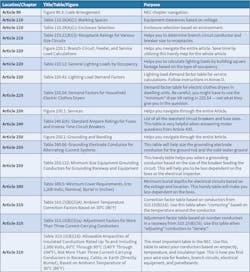For many electricians, journeymen, and engineers, taking a licensing examination is one of the most important and challenging goals to achieve in their career journey. Once you accomplish this goal, you can create a more efficient and transparent path to success. In addition, your customers will have more confidence in you and your work. Being a credentialed tradesperson is the highest form of professionalism in the trades — it shows you’re serious. This test is not just a test; it’s a game changer. Being a licensed master electrician can change your life, your income level, and the legacy you’ll leave behind.
As a master electrician, trainer, and instructor for more than 30 years, here are some tips that have produced consistently positive results with my students.
Create a study plan, and stick to it.
Exams can be nerve-racking — they challenge our confidence and expose technical deficiencies. This exam will force you to face the areas in this craft where you do not excel. That’s okay, but use this to your advantage by hitting any potential problem areas head on.
First, create a consistent study plan you’ll stick with. Don’t be greedy with your daily routine, piling up appointments and promises to others on your study days. Learn to say no to customers who add on additional items at the last minute, typically when it’s time to go. Just reschedule a return visit, and do it another time — no matter how hard it is. Practice being more conservative with your time when you must study, avoiding anything that will interfere with your routine. Once you break your study pattern, it’s extremely hard to regain the rhythm.
Some electricians thrive on a “last-minute cramming” lifestyle, but this is certainly not the best way to ensure success. Most of us aren’t natural test takers, so remember not to fall into this trap.
Set realistic goals for your study routine. Don’t study when you’re fatigued — you’ll learn and retain information best with a fresh mind. Sort out your obligations, arranging them by priority, and then set up a timetable for when you’re going to study. Organize what content or subject areas you plan to study when, giving some subjects more time than others (depending on your areas of deficiency). You must feel comfortable during your study period. Most people learn better when they isolate themselves, but do whatever works best for you. Watch YouTube videos. Read EC&M articles. But most importantly, remain focused.
Make sure your notes are neatly organized and that you have enough space to spread your textbooks, charts, and notes out. Work in a brightly lit area, use highlighters/sticky notes, and sit in a comfortable chair. Get rid of distractions — avoid computer games and family members during study sessions. Explain to them why you need at least a few hours per day to study at home, and stick to this regimen. In addition, always travel with study material, ensuring you’ll make good use out of “all” of your downtime. This little secret will put you on the path to becoming a lifelong learner. Do whatever it takes to intensify your focus on success, such as installing a vision board on the wall in front of you. Keep your motivation high. Don’t let anything or anyone stress you out during this period.
Check the testing center’s website for information on the specific exam you’re taking. If you’re taking a state examination, find information on the exam layout, subject matter, and content. Check with anyone you know who may have taken the exam recently or in the past.
Most state exams or major cities have exams that are five hours long. New York has a practical hands-on portion of the exam. Make sure you’re mentally and physically prepared for that type of test.
Most electrical exams are “open book,” so find out what you’re allowed to bring into the testing center. Some test sites allow additional handbooks like the “Ugly’s” electrical helper book, the English dictionary, and the NEC Handbook. Use every advantage you can. You can even call the testing center and ask questions ahead of time.
It’s test day
Get some rest the days leading up to the test. Don’t arrive at the test center stressed, tired, or not feeling your best due to a late night of partying. Remember Murphy’s Law — anything that can go wrong will go wrong on test day. So be prepared to do some serious time management planning in advance of the actual test day. Visit or plan a route to the testing center. Leave home early so that you don’t have to speed. Arrive on time. The test center proctor may not be empathetic to your reason for being late. Have everything you need to complete the sign-in procedures at the testing center, such as a valid form of “non-expired” government-issued photo ID with your signature.
Be confident, and have your plan ready when you hit the start button.
How to take the exam.
The test creator strategically arranges the questions (randomly) in a way that is designed to create stress, anxiety, and confusion. You may be given difficult questions right at the beginning of the exam, but don’t let this throw you off.
Here’s the number one rule to follow: Skip questions. Don’t take the exam in the order in which it is given to you. Most testing software platforms will give you the option to “skip” a question and go to the next one. For the first few hours of the exam, answer questions that require the least amount of time. Focus on the “low-hanging fruit” first if you will — going from the least difficult to the most difficult.
Exam questions can be organized by the number of steps it takes to answer the question. Some may take only one; others could take up to five steps. For example, service calculations, some motors questions, and anything that requires a table typically require three to five steps to get an answer. Avoid these questions early in your exam; the goal is always to save time in the beginning. Doing this will leave you with enough time allocated to answer the more time-consuming questions at the end. This will also leave you time to review all of your answers before you hit “finish.”
Also remember that all questions aren’t created or weighted equally. The exams in my area, for example, have a “General Knowledge” section and a “Plans Reading” section that feature very time-consuming questions. Save those for the end.
Parting tips
When preparing for any kind of electrical licensing exam, remember these golden rules:
- Re-arrange the questions in an order that makes you feel more comfortable, even if you have to skip the first 10 to 20 questions. Answer the easy ones first.
- Work on math and motor problems last. This will save you time.
- Associate Chapters with Articles. For more tips on how to do this, read my previous article (The NEC for Newbies in a Nutshell), and watch the accompanying webinar.
- Highlight the important Tables and Figures noted in this Table. If possible, bring a copy of this Table to the exam.
In summary, to pass an exam like this, “getting your mind” right from the start is one of the most important strategies you can use to your advantage. You must not only understand the flow of the test but also the nuances and language of the exam. Paying specific attention to all of these aspects of test taking will inevitably improve your score in the end as well as your chances for continued success in your lifelong journey of electrical learning.
Harold De Loach, a master electrician and electrical trainer/instructor, is the founder of The Academy of Industrial Arts in Philadelphia. He is also the director of education and training for www.necprepclass.com, which provides electrical license preparation courses for the city of Philadelphia and the Lehigh Valley Allentown, Pa., areas. With more than 30 years of experience in the field, he writes regular exclusive content for the E-Train newsletter and can be reached at [email protected].
About the Author
Harold De Loach
De Loach is the Director of Education and Training for the Leaders of Electrical License Preparation courses for Philadelphia and The Lehigh Valley (www.necprepclass.com). He is the founder and Director of The Academy of Industrial Arts L.L.C. (www.taia-school.com), a customized electrician training program that provides entry-level electrician training courses, electrical safety classes and customized electrical construction courses. He is trained by the National Center for Construction Education and Research (NCCER). He is a member of The National Society of Collegiate Scholars, the Independent Association of Electrical Inspectors, the Electrical Association of Philadelphia, and the Better Business Bureau.
His level of knowledge affords him to teach entry, intermediate, and master level electricians. Armed with more than 20 years of experience in the electrical, general construction, and real estate development industry, he offers his students and clients several unique skill sets. He has worked as the Head Craft Instructor and Assistant Director of Education at the Apprenticeship Training Center (affectionately known as The ABC School) in Harleysville Pennsylvania for Associated Builders and Contractors (The South-Eastern Pa. Chapter). Prior to Joining ABC, he directed a work-readiness (Re-Entry) Construction Technology program within The Philadelphia Prison System and as an Electrical Technician Program instructor at Kaplan Career Institute (Formerly Thompson institute) in Center City Philadelphia and Franklin Mills. He is available for consultation, private tutoring, speaking engagements, or strategic partnerships that can bolster the number of new electricians entering the industry.




